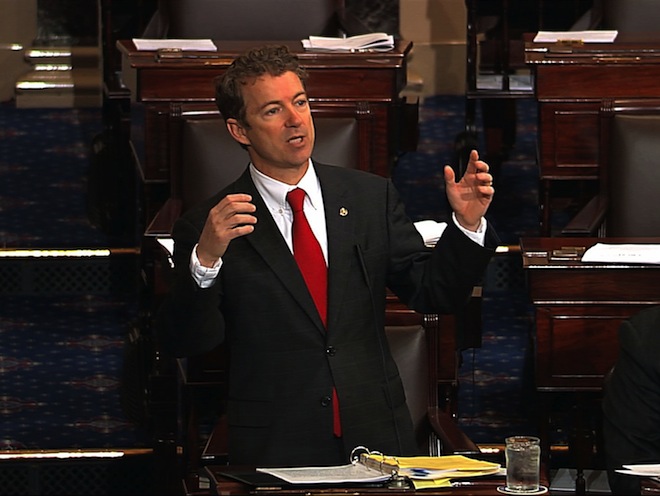Sen. Rand Paul (R-KY) wants to give visas to America’s 11 million undocumented immigrants that would allow them to stay and work in the country. And if they apply for green cards and eventually become citizens, that’s fine, too. But, for whatever reason, Paul really does not like calling this idea a “path to citizenship.”
That’s the upshot of a press call Paul held on Tuesday after a daylong struggle to make his position clear.
“The immigration debate has been trapped and it’s been polarized by two terms: ‘path to citizenship’ and ‘amnesty,'” Paul told reporters.
Paul delivered a speech on immigration Tuesday morning in Washington, D.C., to the Hispanic Chamber of Commerce in which he pledged to support reform, but did not mention citizenship. His staff pushed back afterwards against an Associated Press report that characterized his plan as a “path to citizenship,” but after hearing the objections the news agency stood by its original characterization.
They were right to do so. The plan Paul laid out in his afternoon call sounded identical in principle to plans put forward by a group of bipartisan senators and by the White House, both of which contain a so-called “path to citizenship” that would allow illegal immigrants here today to obtain green cards (after meeting certain conditions) and eventually naturalize. And it was easily more progressive than the proposal outlined by Jeb Bush in his recent book, which would have specifically barred illegal immigrants from becoming citizens.
“As long as those here want to work, I’d get them work visas, and as long as they want to apply you get in the normal line for citizenship that’s already available, so it’s not a new pathway, it’s an existing pathway,” he said. “And then we need to figure out if the existing pathway isn’t working, how do we fix the existing pathway?”
Paul even suggested that if green card backlogs grow too long to process a wave of applications from legal immigrants abroad and newly legalized immigrants in America, he’d be open to speeding things up by temporarily adding more slots or some other means.
“I’m not granting any new pathway or new line — the only thing I’m saying that’s new now is that I don’t think you should have to go back to Mexico to apply,” he said.
This kind of rhetoric hardly separates Paul from the pro-citizenship crowd. Sen. Marco Rubio (R-FL) and President Obama alike routinely describe their favored plan as one in which undocumented immigrants would have to “go to the back of the line” behind legal applicants in order to obtain a green card. And Paul is actually more liberal on the process then some past versions of immigration reform, which would have required undocumented immigrants to briefly return to their home countries to apply for a visa.
Paul isn’t the first Republican to send mixed signals on citizenship, apparently for fear of using the phrase “path to citizenship.” Rep. Bob Goodlatte (R-VA), chairman of the House Judiciary Committee that will oversee immigration legislation, panicked reformers when he ruled out a “path to citizenship” for illegal immigrants — only to clarify later that he’d be fine with letting them apply for green cards and citizenship through the regular process.






